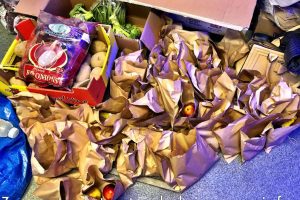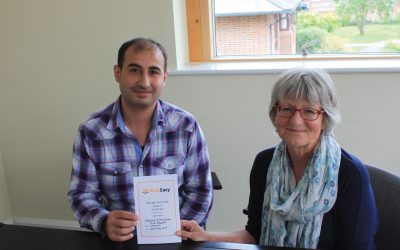Over the past 12 months of the coronavirus pandemic, foodbanks have come under the most extreme of pressures. Rotary clubs nationwide have responded with cash, volunteering, and even the pioneering Rotary4foodbank scheme in the Midlands and South Yorkshire.
FoodCycle is not a foodbank. Instead, the charity aims to tackle food waste, food poverty and loneliness by using donated surplus food to provide communal hot, nutritious meals to those who want them.
In London, Rotarians have been active over the past year working with FoodCycle, which provides a cooked meal at least once a week.
“Edgware and Stanmore Rotary has been involved since I started volunteering about four years ago,” explained Peter Bradley. “Being a foodie, it was an ideal organisation for me which ticked so many Rotary boxes.
“It works well with our service ethos, and introduces younger volunteers to Rotary through the project – people who have previously never heard of us.”
The model is a simple one. Volunteers collect surplus food which would otherwise be thrown away or go to waste, from local supermarkets and small shops. The food is always within the sell-by date and is checked for freshness.
Being a foodie, it was an ideal organisation for me which ticked so many Rotary boxes.”
“The amount of surplus food available is often mind-boggling,” added Peter, who works with a project based at Finsbury Park in North London.
“In just a few short hours from collection, volunteers have transformed the ingredients into a delicious three-course vegetarian meal ready for that day’s guests.


Instead of hosting meals, during the pandemic food parcels were distributed weekly
“The meals are cooked from scratch and often include up to five portions of fruit and vegetables. Any left-over portions of food are offered to the guests for them to take home.”
“Guests and volunteers sit together to eat and talk. The personal stories that often emerge can be humbling but also exhilarating.”
Guests come from all sorts of backgrounds; refugees, the homeless, asylum seekers or simply elderly and lonely. Some may not have spoken to anyone for a whole week or more.
COVID-19 has changed the landscape entirely. At first, when the initial lockdown was introduced a year ago, everything came to a standstill. However, the need for food supplies doesn’t go away.
The meals are cooked from scratch and often include up to five portions of fruit and vegetables.”
In North London, FoodCycle got up and running pretty quickly. Instead of hosting meals, food parcels were distributed weekly.
Fresh fruit and vegetables, along with donated cooked meals from top restaurants were delivered to the community centre in Finsbury Park to be bagged up and a team of volunteers, including members of Arsenal Football Club, distributed them.
One of the aims of FoodCycle, apart from tackling food waste and food poverty, is tackling loneliness, so a new service was started.
Volunteers phoned food parcel recipients for a chat once a week, which was a great boost to those who were isolating and to those volunteering.
“As restrictions began to ease, there was a great desire to get back cooking,” explained Peter. “And as the premises were huge and we had a large kitchen, a team of six volunteers cooked takeaway meals, which were collected each week from the Community Centre.”
COVID-19 has changed the landscape entirely. At first, when the initial lockdown was introduced a year ago, everything came to a standstill.”
Despite these uncertain times, the FoodCycle projects are still operating nationwide. They are still cooking, handing out meals and volunteers continue to make weekly calls, providing much-needed food and conversation to people within our communities.
This year, FoodCycle has rescued over 200 tons of surplus food which equates to more than 440,000 meals for vulnerable people.
According to FoodCycle, 66% of guests worry about their food running out, 65% are forced to skip meals and 26% cannot work due to health problems.
View this post on Instagram
After coming to FoodCycle, 79% say they feel more part of the community, 76% eat more fruit and vegetables and 77% say they have made new friends.
“From a Rotary perspective volunteering or helping in other ways with FoodCycle exemplifies Rotary’s core values,” added Peter.
“Rotarians who have been introduced to FoodCycle have become enthusiastic supporters in particular Rotaractors.
“Clearly, not everyone is as enthusiastic about cooking as I am but there are plenty of other volunteer activities. FoodCycle needs people to lay tables, sit and chat, welcome guests, serve meals, and of course help clear up.
“Also, Rotarians with transport are needed to collect food from shops and supermarkets.”
To find out more visit www.foodcycle.org.uk


























































